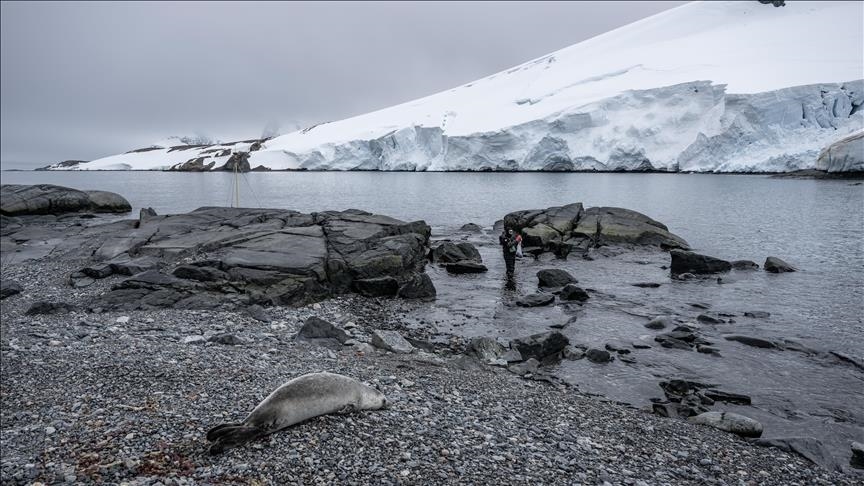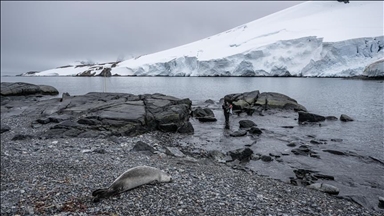As Greenland’s ice breaks up, the future of local fishing drifts into further peril
'A lot of ice breaks off in the glacier ... some days, we cannot even go out and sail because all the fjords close,' local fisherman Johan Henrickson says

- Rising temperatures are posing a growing challenge for the fishing industry in Greenland, where thinning icebergs are becoming too treacherous to fish on or cross
- 'Here, you get for the cod fish without a head about 17 Danish kroner ($2.59), and then it will be sold in Europe for about 250 kroner,' a young fisherman tells Anadolu
LONDON
In the fjords of western Greenland, where towering icebergs once served as the reliable backdrop to daily life, local fishermen say the ice is no longer dependable — or even present.
As the Arctic warms at nearly four times the global average, the once-stable sea ice that supported generations of Greenlandic fishers is vanishing. With it, a way of life rooted in centuries of tradition is also in jeopardy.
“There’s a lot of difference here. This year, it has been very bad for fishing, because of, maybe, the global warming,” said Johan Henrickson, a local fisherman in Nuuk, the capital of the Danish territory.
He tells Anadolu that in May, the fifth month of the year, the normally ice-covered area had "a lot of days" with temperatures above freezing.
Climate crisis in real time
Greenland is on the front lines of climate change, and its fishers are among the first to feel the consequences. According to the Danish Meteorological Institute, sea ice around Greenland has declined by more than 50% since 1980, and average air temperatures in parts of the island have climbed by more than 3 C (5.4 F) over the past three decades.
These changes are not body_abstract statistics for Greenlanders — they affect daily survival. Sea ice traditionally acted as both a fishing platform and a transportation route in remote communities with few roads. Now, thinning and unpredictable ice conditions make it hazardous to traverse them.
Winter ice fishing, once a reliable seasonal occupation, is no longer viable in some regions. Without ice, fishermen must rely more heavily on boats that require fuel and maintenance costs that many cannot afford.
Henrickson and Aviaia Juelsen are two young fishermen who have teamed up to fish in the fjords off the coasts of Greenland’s capital Nuuk.
“A lot of ice breaks off in the glacier inside the fjord, so we have more ice than usual. Some days, we cannot even go out and sail because all the fjords close,” Henrickson said.
“Yeah, that's the way nature is. Sometimes it’s good, and the other day it’s just not so good,” he told Anadolu in a reflective tone.
The warming ocean is also altering the marine ecosystem. Fish that once thrived in Greenland’s cold coastal waters — including halibut and cod — are moving northward or descending to deeper, colder layers in search of suitable habitats.
In southern Greenland, cod — once a staple of the fishing economy — have become scarce. In the north, fishermen are reporting unusual catches: species like mackerel, previously unknown in Greenlandic waters, now appear in summer.
A hard job
Henrickson said it takes about 30 minutes to an hour to reach the fishing grounds, depending on the waves.
“Then, we put the long lines in. It takes about two hours, and then we sail back again — so about four hours round trip,” he said.
“We go after catfish, and sometimes we also get the halibut — flat fish.”
He added that the government has introduced policies he believes are aimed at pushing older generations out of the fishing industry, including banning those over age 30 from the profession.
“We wear warm clothes because it’s cold out there,” he said. “Every knot you go faster, the temperature feels about half a degree colder.”
“So, if you sail at 20 knots, it feels like minus 30, maybe. It’s very cold, especially on open waters.”
Local fish, foreign profits
Even as the physical environment shifts, Greenlandic fishermen say they face another challenge: economic exploitation by foreign companies — particularly Danish firms — that dominate the processing and export market.
Much of the fish caught in Greenland is sold at low prices to Danish-owned processing companies, which then export the product to European markets — often at significant markups.
“I think there could be better opportunities here, especially for the fishermen,” Henrickson said. “Because here, you get for the cod fish without a head about 17 Danish kroner ($2.59), and then it will be sold in Europe for about 250 kroner.”
Critics say this gap perpetuates economic dependency and deprives local communities of the full value of their labor and natural resources. Some local leaders have called for higher minimum purchase prices or a Greenland-based export body to give local producers more control over their economic future.
A melting island in the global spotlight
As Greenland’s ice melts, its geopolitical importance is rising. In 2019, US President Donald Trump publicly expressed an interest in purchasing Greenland from Denmark. The proposal was promptly rejected, but nonetheless spotlighted the island’s strategic and economic value.
Though the idea was widely dismissed, many in Greenland saw it as indicative of how the world views their homeland — not as a sovereign territory facing environmental crisis, but as a commodity.
Following his second inauguration, Trump renewed his interest in the world’s largest island, even telling Congress members that, “one way or the other" the US was "going to get" Greenland.
This approach to annex Greenland was once again rejected by both Copenhagen and Greenland’s newly elected Prime Minister Jens Frederik Nielsen, and his remarks also received backlash from local Inuits.
As Arctic waters open and resource interests grow, Greenland’s future is increasingly shaped by external forces — both climatic and political. But for fishers like Henrickson, the greatest concern remains close to home: the changing sea, the thinning ice, and whether the next generation will still be able to make a living from the waters that once sustained their ancestors.
Anadolu Agency website contains only a portion of the news stories offered to subscribers in the AA News Broadcasting System (HAS), and in summarized form. Please contact us for subscription options.







